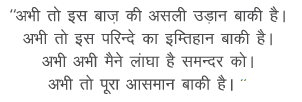As we cross into the New Year, we take a few days off to refresh,
rejuvenate and revive our mind, body and spirit. The day after 31st
December seems so new and yet so much of it is still the same as it has been
for long. Taking time off allows us to reflect on all that is going on around
us and all that we are becoming as individuals and as a society.

Our founding fathers must have dreamt of this when we chose to be a
Republic. We are celebrating our 70th Republic Day this month. Most
constitutions came from the divine rights theory based on an Anglo-Saxon system
where God who had all powers also gave all rights – to life, of speech etc. God
was substituted by the State for giving these rights through a constitution.
The caveat was: the State required the consent of its people. While God can do
no wrong, the State can. Therefore, the responsibility of people is even more.
This model asks us to own up what is happening, to discharge our responsibility
and then claim our rights. Often, people understand it in reverse order – claim
rights and hardly discharge duties.
The constitutional framework stands for and on the rule of law with a
dedicated judiciary to deal with conflict. We have come to a point where justice
is beyond the reach of most people. Can most citizens read or comprehend our
laws? Can a lay citizen knock at the door of the highest court and afford a
lawyer there? Are large parts of the judicial system impartial? Take an example
of ‘tribunals’–where although the judiciary is meant to be out of control of
the government, most tribunals are under direct control of the ministry which
is generally a party in the dispute before that very tribunal! And the time it
takes to close out a court case?
Such clear and visible problems limit the operation of law and impair
the Constitution of the State. In fact, many times the government is in
conflict with citizens for all the wrong reasons. At a recent tax hearing, an
officer mentioned that professionals are responsible for litigation. I asked
him then why does the department lose in most cases and at all levels? He just
said we could talk about this at length at another time!
India, like most oriental societies, is based on relationships, not on
individualism. Individual-based societies require more and more contracts for
everything. My roommate, a professor at UC Berkley, when I first went to the US
told me that all relationships in America were either contractual, functional
or legal. That is not so in our society. Therefore, more thrust on values,
rather than just (poorly drafted) laws, is critical.
Back then Dr. Ambedkar had said: “However good a Constitution may be,
if those who are implementing it are not good, it will prove to be bad. However
bad a Constitution may be, if those implementing it are good, it will prove to
be good.”
These days, many people make it sound as if all good emanates from the
Constitution alone. However, if you read Dr. Ambedkar’s words carefully –
culture, values and ethics are more important – for they make a person and then
whatever she handles will be driven by those values. We need as much or more of
manufacturing of this internal compass pointing towards true north in our
people, as we do for the creation of jobs.
At another proceeding, a tax officer was asking for every single
dividend counterfoil of a senior citizen. The assessee had no email and some
counterfoils were not received in the post. The officer said he would be
questioned and even considered corrupt for not taking every supporting evidence
although the bank statements in his possession mentioned the name of the payer
and amounts were rather small. Such kind of out-of-context excessive
technicalities in respect of an eighty-year-old homemaker assessee leads
nowhere; perhaps encourages some people to evade laws rather than struggle to
prove themselves to be on the right side.
A relationship-based society like India has survived and thrived on
values. I hope we can put much more thrust on building society and creating
social capital than focus on infrastructure, roads, economics alone. No doubt,
it is easier said than done – just as farm loan waiver does not correct the
root causes of the farmer problems, economics and laws without values won’t
solve a societal problem.
Friends, the word of the year declared by two prominent dictionaries
recently gives it away: Toxic1 and Misinformation2. Both
words articulate the stark realities of our times and what we need to fight and
overcome. I leave you with the deep thought that a poet articulates poignantly:

When there is so much falsehood in the world, how does one understand
what is true? How can one sell a mirror, in a marketplace full of (people
wearing) masks?
___________________________________
1 Oxford Dictionary for 2017
2 Dictionary.com for
2018
Happy New Year 2019!
Raman Jokhakar
Editor













